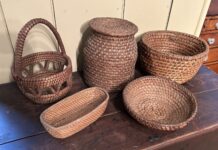When I was a kid I’d hear some of the older farmers in the neighborhood talk of planting something by the dark of the moon, while other crops must be sown in the light of the moon. My own father and grandfather didn’t mention such requirements for farming operations so I never learned the ins and outs of the business.
Superstitions
Of course such beliefs were nothing but superstitions, although the believers might say, lots of folks don’t believe in signs, but the frost nips them folkses’ taters heaps of times.
Gardeners, especially, were vitally interested in the moon phases and many were convinced that root crops, such as potatoes, beets, carrots, etc. must be planted in the dark of the moon, while beans, peas, lettuce, and other above-ground crops need to be planted when the moon was full, or nearly so
The moon also had a big effect on calving; if a calf is expected, it is bound to be thrown during the new moon, not the full moon.
Weather signs
Farmers didn’t give a fig for professional weather prognosticators they looked for signs. If rain was imminent, there would be sweat on the outside of the metal watering trough, or a chicken would have its head under its wing, or maybe the hogs would start to fight in the pen, all sure signs of rain.
If the electric wires to the barn hummed loudly, the storm would be electrical; if the horses started running wildly in the pasture, or a snail was found climbing up a tree trunk, the storm would be a real gully-washer.
Then there were the witchers: men who had the ability to find the best place to dig a good well by carrying a forked willow branch in front of them.
When the tip of the twig, of its own accord, bent toward the earth, it meant there was an underground source of water.
Bad luck!
There were many other such beliefs: don’t drop your hat on the bed, or sleep with the toes of your shoes pointed under the bed, or you’re sure to have bad luck. Other well-known bad luck omens were breaking a mirror, walking under a ladder, or having a black cat cross your path.
One should never bring a shovel into the house, idly rock an empty rocking chair, or allow two people to pass on the stairs or bad luck would surely ensue, while one should never, ever sleep in a bed someone had died in..
If your family was moving, you must leave your broom behind or bad luck would surely follow, unless, of course, you first threw it over the old house. A woman who had just given birth must wear a thimble when she drew her first bucket of water or the baby wouldn’t thrive. One mustn’t sweep under the bed of a sick person or that person will never get well, and one should never go to sleep with one’s feet higher than one’s head.
Folk remedies
There were innumerable folk remedies that house wives firmly believed would cure all physical complaints. Pig’s feet were saved at butchering time, some to pickle and eat, while others were boiled to make hoof tea which was given to children to guard against colds and flu. Leg cramps at night were prevented by turning your shoes upside down before retiring, while a pan of kerosene under the bed helped rheumatism.
If you had chills and fever, you wrapped yourself tightly in a sheet, ran around the house three times and then jumped under the bed; the confused chill would jump into the bed by mistake and you were rid of it. Garlic worn around the neck was also thought to ward off disease, probably by keeping anyone who might pass on a germ, far, far away.
Signs of death
Death was much on the minds of our ancestors and they were always on the lookout for any sign that death was imminent. For example, if a clock stopped, a picture fell from the wall for no apparent reason, a rooster crowed at mid-night with no answering call, an owl was seen during the day, you heard a whippoorwill in the night (when I was a kid we often heard whippoorwills at night and no one died, however I haven’t heard one now for decades), a mirror broke for no reason while hanging on the wall, or a black-bird pecked at the window, someone near and dear was bound to soon pass from the earth.
After the death the mirrors in the room where the person died were turned to the wall or covered (seeing itself in a mirror might confuse the spirit) and the windows opened to allow the spirit to pass. The body had to leave the house by the front door and feet first or the spirit might return.
Animal care
Animal care was provided for as well: to keep a dog from getting distemper string corncobs sprinkled with turpentine on a length of baling wire to fashion a necklace for the poor critter. To clear up worms in a dog, feed him a can of sardines and to keep your sow from coming in season simply tack a length of copper wire to the bottom of her feed trough.
Some other miscellaneous beliefs were that thunder in February means frost in April, gourd vines planted around the house will keep snakes away, and if you can’t sleep, get up, turn your pants pockets inside out, put your hat on backwards, and go back to bed and to sleep.
Nightmares can be prevented by sticking matches in your hair before going to bed, and if you suffer from corns, just let a snail crawl across your toes and the corns will disappear.
A love-sick young man can assure the love of any maiden by somehow getting a lock of her hair and burying it under his doorstep.
These old beliefs seem quaint in this more enlightened day, but I still see lots of copper bracelets on people’s wrists.
Homemade tractor
In my Nov. 21 story about the homemade tractor named Billy, I mentioned that I could find no reference anywhere to a Pacemaker gasoline engine. Well, I just didn’t look far enough, as pointed out by Sam Wood, from Glen Dale, W.Va. who sent me a note and a photo of the engine.
The Pacemaker was an inverted vertical engine made by the Temple Pump Co. of Chicago and the 5 H.P. model was introduced about 1910.
Thanks for the information, Sam.












